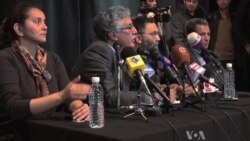TUNIS —
A week after the assassination of Chokri Belaid, Tunisian opposition parties are uniting to demand that the government be dissolved and fresh elections held. Belaid was a prominent critic of the ruling Ennahda party and many opposition groups blame its supporters for the killing. The incident has shaken the fledgling democracy.
As the face of Chokri Belaid stares out from billboards across Tunis. The caption above it implores the people to stand up for Tunisia.
His assassination has brought together the previously fractured opposition.
In a packed conference room in one of the capital’s big hotels, opposition activists, trade unionists and lawyers debate Tunisia’s future.
The National Congress for Salvation is one of several newly-formed coalitions that could alter the face of national politics. The Workers’ Communist Party is among its members. Hamma Hammami is the party spokesman.
“You ask me if the government is offering solutions? Solutions to what? To the violence? To investigate the murder of Chokri Belaid? They do nothing," Hammami said. "For the political neutrality of the mosques? Nothing.”
The Ennahda party denies any knowledge of or involvement in the assassination.
Chokri Belaid was the leader of the Unified Democrat Patriots’ Party. Its vice president, Mohamed Jmour, says the killing is an attack on democracy.
“These are people who do not accept the ideology of freedom, of social justice, of equality between men and women in Tunisia - values that Chokri Belaid defended," said Jmour. "They do not accept the idea of a democratic country, a non-religious democratic republic.”
Beji Caid Essebsi was interim prime minister after the revolution. His party, Nidaa Tounes, has entered an alliance with four other parties to purportedly ‘safeguard the principles of the revolution."
“Evidently we have two different types of society in Tunisia. We are for a Tunisian society of the 21st century," Essebsi said. "We want to close the gap with other developed countries, because we are being left behind. The others want a Tunisia that lives in the seventh century; they want to take us backwards.”
Two years after the revolution, members of the National Constituent Assembly are still battling over the constitution. The prime minister has called for government ministers to be replaced with non-political technocrats until elections are held.
Samir Dilou, the minister for human rights and a member of Ennahda, rejects that idea.
“Ennahda supports the idea of a government of national competencies which has the agreement of the widest political spectrum,” he said. “This is for the highest interest of Tunisia, because we are facing important political challenges and in order to resolve them we need the largest coalition.”
For now, Tunisia’s fledgling democracy appears deadlocked.
On the streets there are fears that the political rivalries could spill over into more violence in the birthplace of the so-called Arab Spring.
As the face of Chokri Belaid stares out from billboards across Tunis. The caption above it implores the people to stand up for Tunisia.
His assassination has brought together the previously fractured opposition.
In a packed conference room in one of the capital’s big hotels, opposition activists, trade unionists and lawyers debate Tunisia’s future.
The National Congress for Salvation is one of several newly-formed coalitions that could alter the face of national politics. The Workers’ Communist Party is among its members. Hamma Hammami is the party spokesman.
“You ask me if the government is offering solutions? Solutions to what? To the violence? To investigate the murder of Chokri Belaid? They do nothing," Hammami said. "For the political neutrality of the mosques? Nothing.”
The Ennahda party denies any knowledge of or involvement in the assassination.
Chokri Belaid was the leader of the Unified Democrat Patriots’ Party. Its vice president, Mohamed Jmour, says the killing is an attack on democracy.
“These are people who do not accept the ideology of freedom, of social justice, of equality between men and women in Tunisia - values that Chokri Belaid defended," said Jmour. "They do not accept the idea of a democratic country, a non-religious democratic republic.”
Beji Caid Essebsi was interim prime minister after the revolution. His party, Nidaa Tounes, has entered an alliance with four other parties to purportedly ‘safeguard the principles of the revolution."
“Evidently we have two different types of society in Tunisia. We are for a Tunisian society of the 21st century," Essebsi said. "We want to close the gap with other developed countries, because we are being left behind. The others want a Tunisia that lives in the seventh century; they want to take us backwards.”
Two years after the revolution, members of the National Constituent Assembly are still battling over the constitution. The prime minister has called for government ministers to be replaced with non-political technocrats until elections are held.
Samir Dilou, the minister for human rights and a member of Ennahda, rejects that idea.
“Ennahda supports the idea of a government of national competencies which has the agreement of the widest political spectrum,” he said. “This is for the highest interest of Tunisia, because we are facing important political challenges and in order to resolve them we need the largest coalition.”
For now, Tunisia’s fledgling democracy appears deadlocked.
On the streets there are fears that the political rivalries could spill over into more violence in the birthplace of the so-called Arab Spring.












